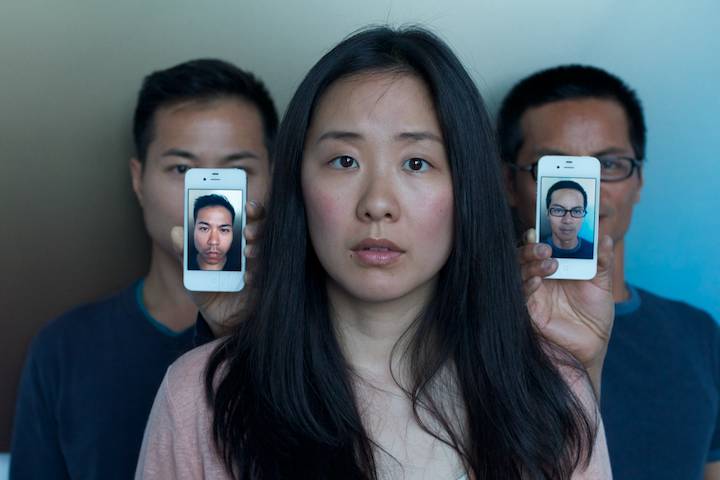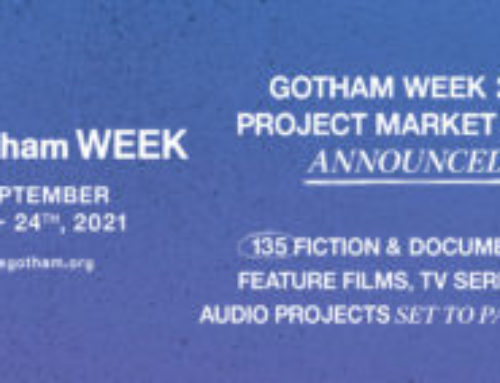The Hundred Flowers Project: Life Reflected in a Hall of Mirrors
by Jean Schiffman, SF Arts Monthly
In Christopher Chen’s new, ultra-metatheatrical play, The Hundred Flowers Project, a small American theater company, led by a charismatic director, is devising a drama about the Chinese revolution. The group aims to meld Mao Zedong’s zeitgeist, as they call it, with their own, thus reflecting the psychology of both.
Which is, not coincidentally, part of Chen’s goal, too.
Flowers, a Crowded Fire Theater Company/Playwrights Foundation coproduction, begins with the (fictional) company hashing out the script. “We’re interested in how modern China and America both have these roots in the ‘common man,’ whatever that means,” muses a character, as the group struggles to formulate its ideas. In this collaboration, everyone’s opinion counts, even–in theory, anyway–that of Julie, a shy outsider and the new wife of Mike, one of the actors. Down-to-earth Julie is the opposite of the adventurous actress Lily, Mike’s former girlfriend.
As the rehearsal proceeds, alliances form and reform, doubts and suspicions arise and tensions mount. “There’s weird hoodoo in the air,” mutters Lily. In addition, Mike and Julie’s fragile relationship is approaching a critical impasse. When Mike, seeing that his all-consuming involvement in the play is threatening his marriage (and this isn’t a spoiler; the plot is infinitely layered and twisty), announces his intention to quit, everything changes instantly: Something bright and loud and scary–undefined in the play, but Chen refers to it as the Tech Monster–intervenes. Just as in the historical play they’re writing, in which Mao leads the masses from the early days of “let 100 flowers bloom” and the Great Leap Forward through the Cultural Revolution, Mike and Julie and the others are not, it turns out, masters of their own fate.
Indeed, in Act Two, history has been tidily erased and what seemed a realistic comedy has taken on an air of mystery and menace.
“What excites me most about writing, period, is taking a big historical event and trying to find that specific psychological germ, or contradiction, or issue, and see how I can spin off that–going from the abstract concept to the more specific,” says Chen, at a café near his Outer Sunset home. “I get to get into the real nitty gritty of drama between two people and also put on my nerd cap and do a lot of reading and research.” Among his sources were two massive tomes about Mao.
Chen, a native San Franciscan with an M.F.A. in playwriting from San Francisco State University, broke out nationally in 2007 through the Bay Area Playwrights Festival with Into the Numbers, about author Iris Chang and her book The Rape of Nanking; it was workshopped at the Lark Play Development Center in New York and elsewhere, and produced by the Beijing International Fringe Festival. Chen mentions as his influences such playwrights as Beckett, the absurdist comedies of Ionesco, Stoppard’s “gigantic structural experimentations,” filmmaker David Lynch’s evocations of dream states, movies like Apocalypse Now and books like Don Delillo’s White Noise. Inspired especially by the latter two, he says he structured Flowers as “a meditation, variations of a theme, rather than a straight-forward story. And like those examples, it’s a meditation on the links between giant socio-historical movements and very interior psychological spaces.”
When Marissa Wolf, artistic director of Crowded Fire, invited him to pitch an idea for a commission, Chen–whose mother is Caucasian and whose Chinese father had lived in China at the beginning of Mao’s reign–gravitated to the Chinese revolution, to that “rebirth/destruction dynamic,” as he puts it. What initially attracted him was the dichotomy between the natural and the unnatural–Mao’s way of saying that revolution was natural, yet using that concept in increasingly unnatural ways. Immediately Chen saw the link between Mao’s reign and theater itself, which is all about playing with that dichotomy.
He envisioned characters who would be making a play about Mao, which would actually turn into a propaganda play about the making of the play itself … and by then he was well on his way to creating a dizzying hall of mirrors. Among other ideas, it struck him that Mao mythologized himself in the way that dictators do–and in the way that people do today, continually documenting themselves in cyberspace, on Facebook. “So I wanted the play to take on this mythical character and become unnatural,” he explains, “just as the people of China started with this wonderful, organic revolution but slowly became subsumed in this environment that’s as unnatural as the emperors they had in the beginning.”
He sees the play’s Tech Monster, or higher force, as a stand-in for Mao, controlling the people. And the actor-characters, in what evolves into a continuous play-within-a-play, embody many psychological aspects of China’s revolutionary leaders.
Specifically, says Chen, the juxtaposition between the ideal of stability that Mao promised, and the excitement that Mao generated with his concept of “continuous revolution,” is at the heart of what he’s exploring–“the unresolvable contradiction.”
In Flowers, we see a microcosm of that in the relationship of Mike and Julie: “You’re trying to build something that stays the same,” elaborates Chen, “yet you change, things change. How do you grapple with that? That fundamental paradox is the central guiding metaphor.” Declares Lily, “The truth is that everyone is lost. But somehow the person who falsely promises stability… always wins.”
“Chris has a bit of a nihilistic streak,” acknowledges director Desdemona Chiang, a San Francisco-based freelancer who emigrated from Taiwan as a child. “He’s very cerebral, heightened, stylized.” She has been following the script through at least five different drafts. Given Chen’s proclivities, her challenge was to make sure that this play is at its core a love story. For her, it’s about Julie and Mike’s relationship–“a strange journey reflected through the evolution of this theater company and Mao’s reign in China. So even if we don’t get the [historical] overtones, we get the human story, about two people who try to make it work …” Mao, she asserts, is just a starting point; the events of the play could represent any control system where people feel disenfranchised.
Flowers is seen by some, notes Chen, as part serious commentary on China, but as far as he’s concerned, it’s equally a flat-out absurdist comedy, laced with experimental surrealism, satirical and ironic in tone, a level of artifice always present.
“Big historical events come down to the psychology of individuals,” he concludes, “and that affects the psychology of a nation, whether you know it or not.”



